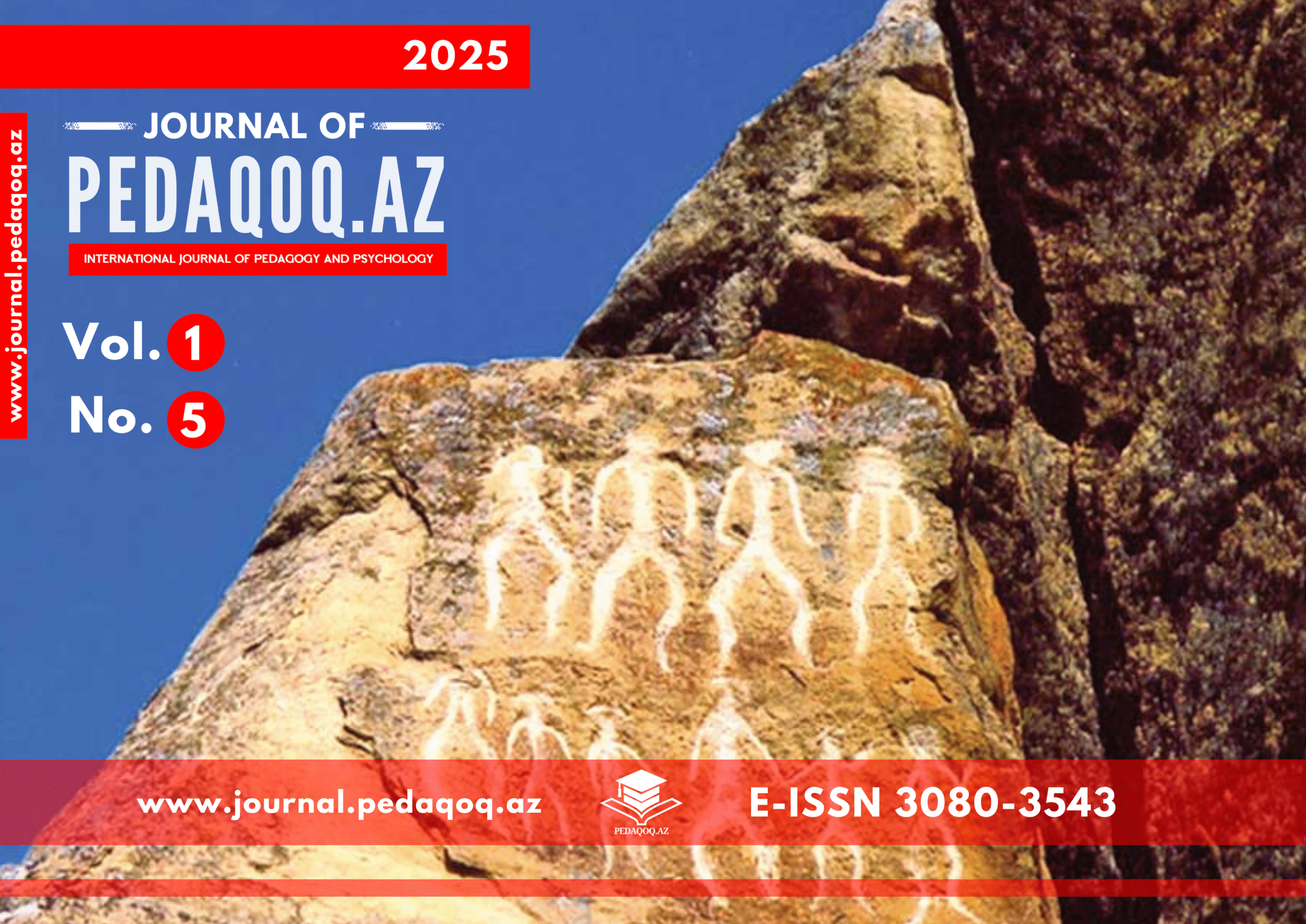Gasimova Tanzila,
Azerbaijan State Pedagogical University
Azerbaijan State Pedagogical College
Baku, Azerbaijan
e-mail: qasimovatanzila@gmail.com
ORCID: 0000-0002-6210-7140
 https://doi.org/10.5281/zenodo.15565481
https://doi.org/10.5281/zenodo.15565481
Keywords: inclusion, barriers, disabled student, inclusive education, discrimination, integration
Abstract. Inclusion has become a key principle in contemporary education and society. However, its effective implementation faces several challenges both globally and in Azerbaijan. These include the physical inaccessibility of schools, widespread misconceptions about the learning abilities of children with special educational needs, and a general lack of awareness about inclusive practices. Additionally, some parents of children with disabilities may struggle to advocate for their rights, while some parents of non-disabled children may oppose inclusive classrooms. These barriers highlight the need for greater awareness, policy support, and collaboration to ensure equal educational opportunities for all.
Introduction
Inclusive education is a process of developing general education that provides access to education for children with special needs and education for all, adapting to the different needs of all children. In general, inclusive education refers to an ideology that treats everyone equally, regardless of nationality, gender, religion, social and physical condition, but creates favorable conditions for children with special educational needs and does not allow any discrimination against children. One of the main goals of the modern education system is to ensure the right of every student to receive equal and quality education, in this context, inclusive education, that is, the integration of students with special needs into general education classes, is of great importance. Inclusive education allows the development of students with different skills and potential, based on the principles of social justice of society. In the broad sense of the word, inclusion encompasses not only the field of education, but also the entire spectrum of social relations: labor, communication, entertainment. In order to create a favorable and friendly environment everywhere, to eliminate barriers in public consciousness, discrimination must be eliminated, and conditions must be created for the integration of everyone into society, regardless of their health capabilities.
Main part. Since our republic is a multicultural and tolerant country, people do not face national, gender, or religious discrimination not only in the field of education, but also in other areas. To a certain extent, shortcomings are manifested in the integration of people with disabilities into society, and the decisions made in this area, the projects implemented, and the steps taken to solve the problem give positive results. Inclusive education, based on the right of all students to receive education, regardless of their individual qualities or problems, ensures their integration into society and creates the basis for the formation of a more just society. This approach, in addition to ensuring the right of children with special needs to receive education, also helps them integrate more easily into society. The introduction of inclusive education in the Azerbaijani education system in recent years has been focused on ensuring the right of every child, including students with special needs, to receive education. Inclusion is an attempt to create self-confidence in students with disabilities, thereby motivating them to go to school like all other children. By learning to live together, children eliminate the boundaries between people with and without disabilities, taking the first and most important step towards the integration of people with disabilities into society. The reason for the difficulty of integrating people with disabilities into society is the state of development of society, which hinders the realization of people’s rights and freedoms with its own obstacles, more than their disabilities. Therefore, the effective organization of inclusive education should begin with educating society in the field of inclusion, so that physical limitations are no longer perceived as a defect in society, but as a feature of this or that person. Inclusion is the creation of a perfect whole from differences when people need each other.
The organization of inclusive classes in the education system is based on the principle that each student has equal opportunities. The main goal is to create an educational environment that meets different individual needs, and in order to achieve this, a number of principles must be followed. These principles include equality, individual approach, social support, teacher professionalism, and adequacy of resources. Based on the principle of equality, the educational process should ensure the participation and right to education of each student. This approach creates a more efficient and comfortable learning environment for all students, not just for students with special needs. Since students’ learning styles, abilities, and interests differ from each other, it is very important to follow the principle of an individual approach for the effective organization of inclusive education. This allows taking into account individual characteristics in the educational process and fully realizing their potential. Since not only academic but also social integration is one of the main goals in inclusive classes, it is important to create an environment of cooperation, respect and mutual support among students. To ensure this, the principle of public support must be preserved.
Special training of teachers, general classroom management, development and implementation of individualized curricula, and the ability to use various methods are essential for the successful organization of inclusive classes. Adaptation of resources refers to the adaptation of educational materials, technologies and the classroom environment to students with special needs, both visually and functionally. The potential for progress in the field of inclusive education in Azerbaijan is great. The country’s economic and social development, the application of international experience and the attention paid to this area in national legislation create a solid basis for the expansion of inclusive education. Strengthening the legal framework and increasing control over its implementation are important conditions for the development of inclusive education in Azerbaijan. The establishment of programs that protect the rights of children in need of special care and the implementation of the reforms envisaged in them further increase the prospects of inclusive education in Azerbaijan.
One of the directions for the effective implementation of inclusive education in Azerbaijan is the implementation of regional expansion in this area. That is, inclusive education should be implemented not only in large cities, but also in the regions. The creation of the necessary infrastructure in schools in the regions and the availability of resources should become a priority task
The most important of the important steps to be taken in the field of inclusive education is the expansion of state programs. Currently, inclusive education models applied in some pilot schools should be spread nationwide. At the same time, it is of great importance to study international experience, study and adapt models of countries with advanced experience in the field of inclusive education.
As in many countries around the world, there are a number of problems and obstacles in the process of organizing inclusive education in Azerbaijan. These difficulties slow down the development of the education system and hinder the implementation of inclusive education. Examples of these include the level of professional training of teachers, material and technical shortcomings, negative attitude of society, legal and administrative problems. Since teachers are the driving force of education, teachers have a great responsibility for the organized organization of inclusive education. However, some teachers do not have sufficient knowledge and skills to work with students with special needs. This creates serious difficulties in the implementation of inclusive education. It is important for teachers to receive special training, be involved in advanced training courses, and have a deeper knowledge of inclusive education methods. Along with teachers, school psychologists, speech therapists, and social workers should also undergo special training and be an integral part of education. In this area, pedagogically oriented universities and secondary specialized educational institutions have a great responsibility. It is necessary to pay special attention to increasing the specialization in inclusive education and adding special courses to the curriculum, and to prepare more professional personnel in this field. Some schools do not have the appropriate infrastructure and resources for teaching students with special needs. This lack of resources creates difficulties in meeting the individual needs of students. In order to adapt the physical structures of schools to inclusive education, it is important to provide physical conditions, make the application of technological tools accessible, and create resource centers. In order to create physical conditions, schools must be provided with ramps, elevators, wheelchair paths, and special equipment according to the needs of children who will be educated in the classroom. The application of special software, interactive boards, and digital tools is one of the main conditions to ensure the effectiveness of inclusive education. Resource centers for children with special needs should operate in each school or educational zone. These centers should have special teaching materials and support services. One of the factors hindering the large-scale implementation of inclusive education is its ambiguous acceptance by society. Existing stereotypes and negative attitudes towards children with special needs make it difficult for them to receive education in schools. Sometimes parents try to prevent a child with a disability from receiving education along with their children. This stems from the lack of empathy, tolerance, etc. in these parents. At the same time, the importance of equality within society is not fully understood. In some cases, parents, having correctly understood the concept of inclusive education, doubt that their children can develop in this environment. Educating society about the benefits of inclusive education, informing the public on tolerance and equality, and sharing successful examples will support the implementation of inclusive education. For this, seminars should be organized for parents, teachers and other stakeholders and large-scale awareness campaigns should be held, public awareness on the importance of inclusive education should be increased, and social perspectives should be changed. Although there is legislation on the implementation of inclusive education, the implementation of these laws is still not fully ensured. Many schools and local education departments do not fully implement the laws. This leads to a slower implementation of inclusive education. Gaps in the legislation should be eliminated, and cooperation between competent institutions in the field of inclusive education should be increased. More coordinated work of education departments would create conditions for a wider implementation of inclusive education. In addition to the problems listed above, obstacles such as the difficulty of individualizing approaches to a large number of students can also be encountered in inclusive classes. The fact that many students with different needs in one class require an individualized approach creates difficulties for teachers. In order to overcome this difficulty, it is appropriate to involve teaching assistants in inclusive classes. In addition, the widespread use of technologies in the learning process and the preparation of simplified and differentiated curricula can help solve this problem.
Conclusion
The organization of inclusive classes is an important step towards ensuring the equal right of every student to education. However, this process requires a progressive approach from both pedagogical and organizational perspectives. Involving teachers in professional development courses, strengthening the technical equipment of schools, educating parents and society, as well as building an environment based on the values of tolerance can contribute to the development of inclusive education. Inclusive education is beneficial not only for children with special needs, but also for the entire society. Although Azerbaijan has made progress in this area, it still faces many obstacles. With educational reforms and increased resources, inclusive education can be applied more widely and equal educational opportunities can be provided to all children.
References
- Hüseynova, N. T. (2014). İnklüziv təhsil. Bakı: Dərs vəsaiti.
- İnklüziv siniflərdə təlimin təşkili. (2018). Bakı: TİPİİ.
- İnklüziv təhsil: Əlilliyi olan uşaqları keyfiyyətli təhsilə cəlb etmək üçün nə etmək lazımdır? (2019). Bakı: BMT-nin Uşaq Fondu (UNICEF).
- İnklüziv siniflərdə əlilliyi olan uşaqların təhsili: Müxtəlifliyin dəstəklənməsi üçün əlverişli mühitin yaradılması üzrə vəsait dəsti. (2020). Bakı: UNICEF, RİİB.
- İnklüziv təhsil konsepsiyası və onun UNICEF-in missiyası kontekstində aydınlaşdırılması. (2020). Bakı: Texniki Kitabça 1, UNICEF.
- Müəllimlər, inklüziv, uşaqyönümlü tədris və pedaqogika. (2020). Bakı: Texniki Kitabça, UNICEF.
- Loreman, T., Deppeler, J., & Harvey, D. (2020). İnklüziv təhsil: Sinifdə müxtəlifliyin dəstəklənməsi üçün təcrübi təlimatlar. Bakı: RİİB.
- Nəzərova, Ş. (2023). İnklüziv təhsilin əsasları. Bakı: ADPU Nəşriyyatı.

